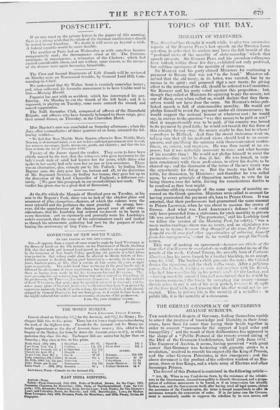TOPICS OF THE DAY.
MORALITY OF STATESMEN.
Tin: Standard has thought it worth while to give two successive reports of Sir ROBERT PEEL'S last speech on the Russian Loan question, in order that its readers may have the full benefit of the profound views of the morality of statesmanship " which that speech presents. Sir RouEar PEEL and his quondam colleagues have indeed, within these few days, exhibited not only profound, but sublime specimens of the morality of statesmen. Sir ROBERT and his party abused Ministers for continuing a payment to Russia that was not " in the bond." Ministers ad- mitted that the old treaty, in its letter, was vacated, but by no means in its spirit ; and proposed the a new treaty, for giving effect to the intention of the old, should be referred to a Committee. Sir ROBERT and his party voted against this proposition ; but, though they railed at Ministers for agreeing to pay the money, not one of them, even when called on, would declare that they them- selves would not have done the same. Sir ROBERT'S twice-pub- lished speech is full of statesmanlike morality. He would not pledge himself to resist the payment under all circumstances; he would support the national honour at whatever cost ; he would say, in answer to the question " was this money to be paid or not?" that it unquestionably was to be paid, if the country was bound to its payment by good finth; he would not tarnish the fair fame Of this country for any sum: the money night be due, but to whom? —perhaps to Holland. And thus the moral statesman went on, taking care that all his profound views should lead to no conse- quenee, and qualifying his opinions with those convenient neutra- lizers, IF, MIGHT, and PERHAPS. He was thus moral at no ex- pense; but it was unluckily necessary to vote ; and what became of his morality then ? He would not pledge himself to resist the payments—they might be due, ff; &c. He was bound, in com- mon consistency with these professions, to allow his doubts to be cleared up ; and the discussion of the terms of the new treaty was the opportunity for doing so. But the treaty was laid on the table, for discussion, by Ministers; and therefore he was called upon, by every principle of Opposition morality, to vote for its being thrown over the table, leaving his conscientious doubts to be resolved as they best might.
Another edifying example of the same species of morality oc-
curred on the Greek question. Ministers were called to account for having guaranteed the payment of a loan to Prince Onto. It was retorted, that their predecessors had guaranteed the same amount to Prince LEOPOLD, when he was about to assume the crown of Greece. And what was Lord ABERDEEN'S defence ?—it could only have proceeded from a statesman, for such morality in private life was never heard of. "Tile guarantee," said his Lordship (and we follow the version of the Morning Post, for safety), "was a • mere understanding—there was no treaty, and no stipulation was made as to terms; Lc:rause they thought at the time, that Prince Leopold would soon find other opportunities qf relierinsT himself from his engagements,--that is, he would not accept the Greek crown.
This way of making an agreement—because One thinks at the
time f/;f it will nerer be concluded—is well illustrated in one of the novels ef the week. Colonel Trump, the rageally hero of livtune- Hunfing, has his name forged, by a brother blackleg, to an accept- ance for 2301. The banker's clerk presents the note ; the Colonel deities the signature, and the clerk walks away. After a judicious the Colo.:el, wishing to save appearances with his friend, who had him coneitlerablv in his power, send,: fir tke banker, and —having carefully sounded him and ascertained that he would by no means compound the fitieny by accepting the money—imme- diately oa'ers to pay it out of his own pocket, iee.ea •at lee thought at the time (and with goad reason) that his ofibr would not be ac-
cepted. This, in private life, is the morality of a swindler ; in public life, it is the morality of a statesman.



























 Previous page
Previous page